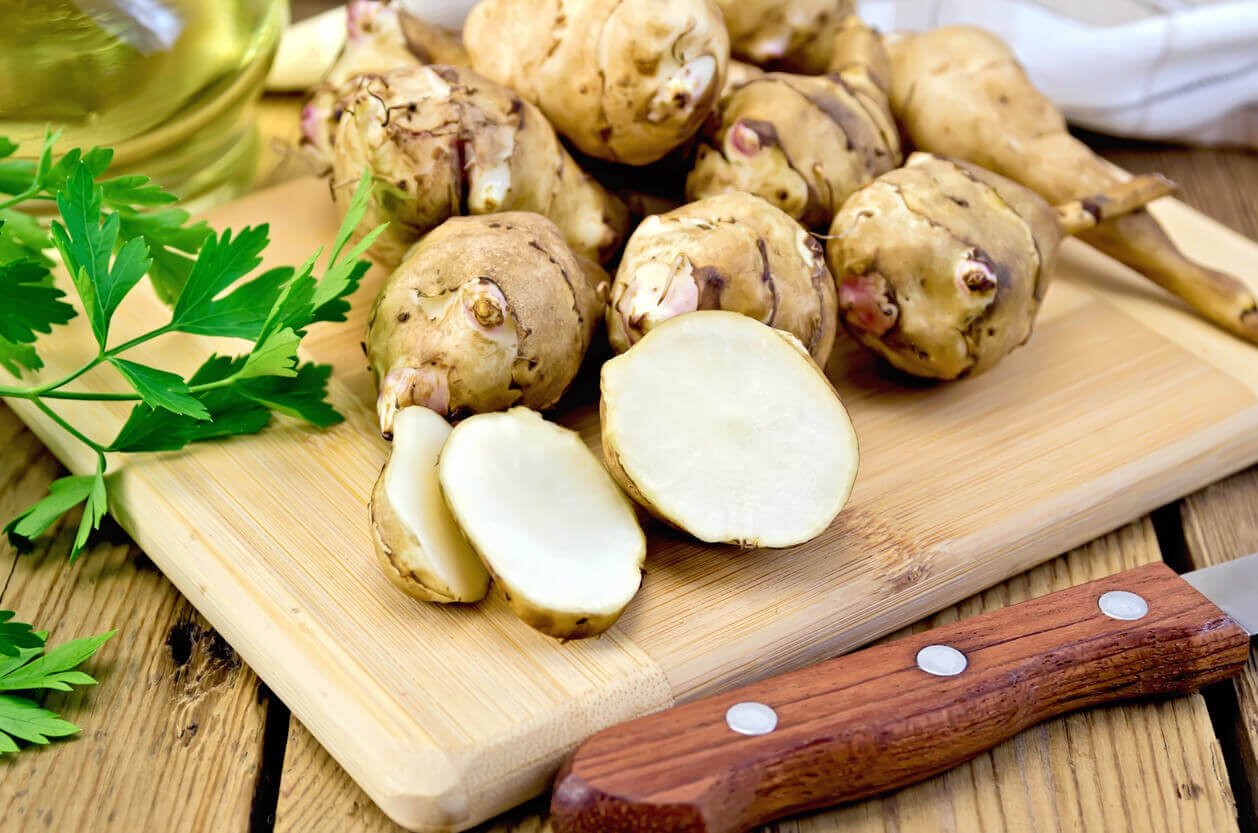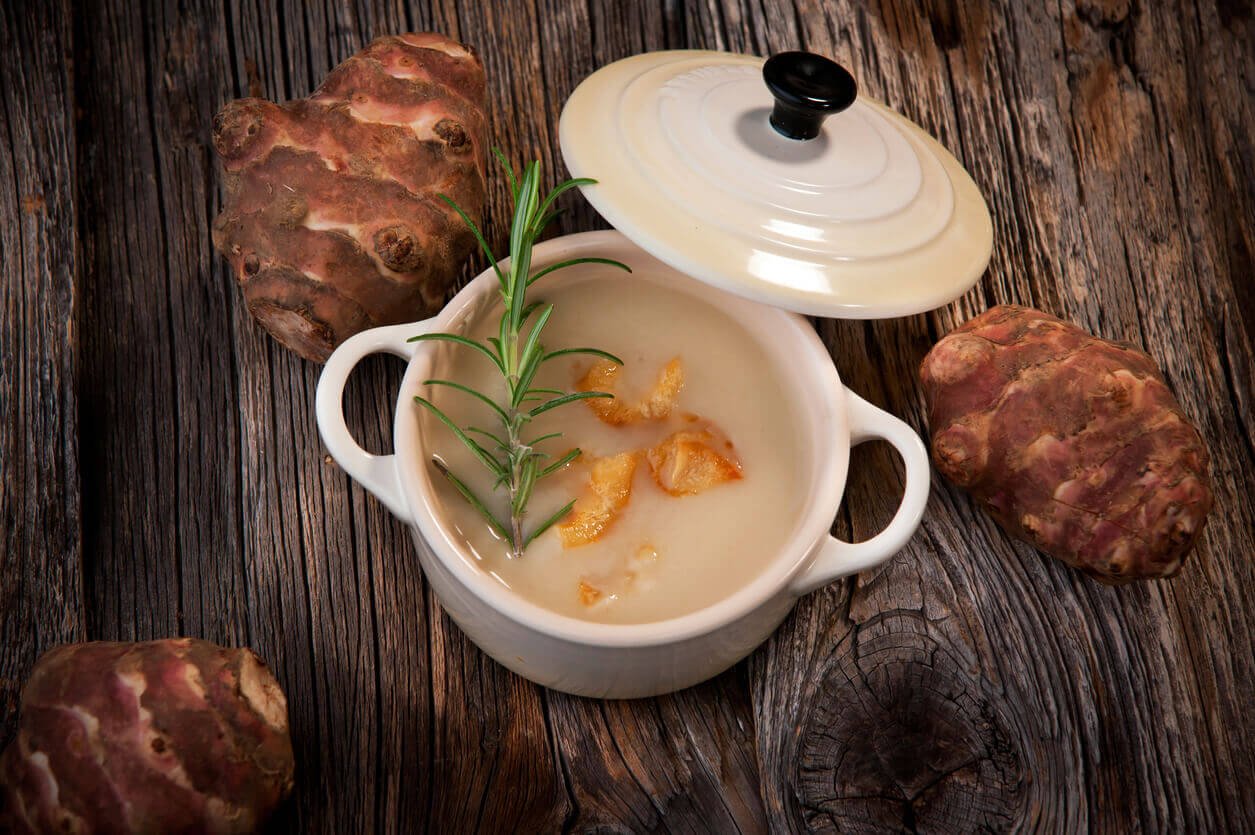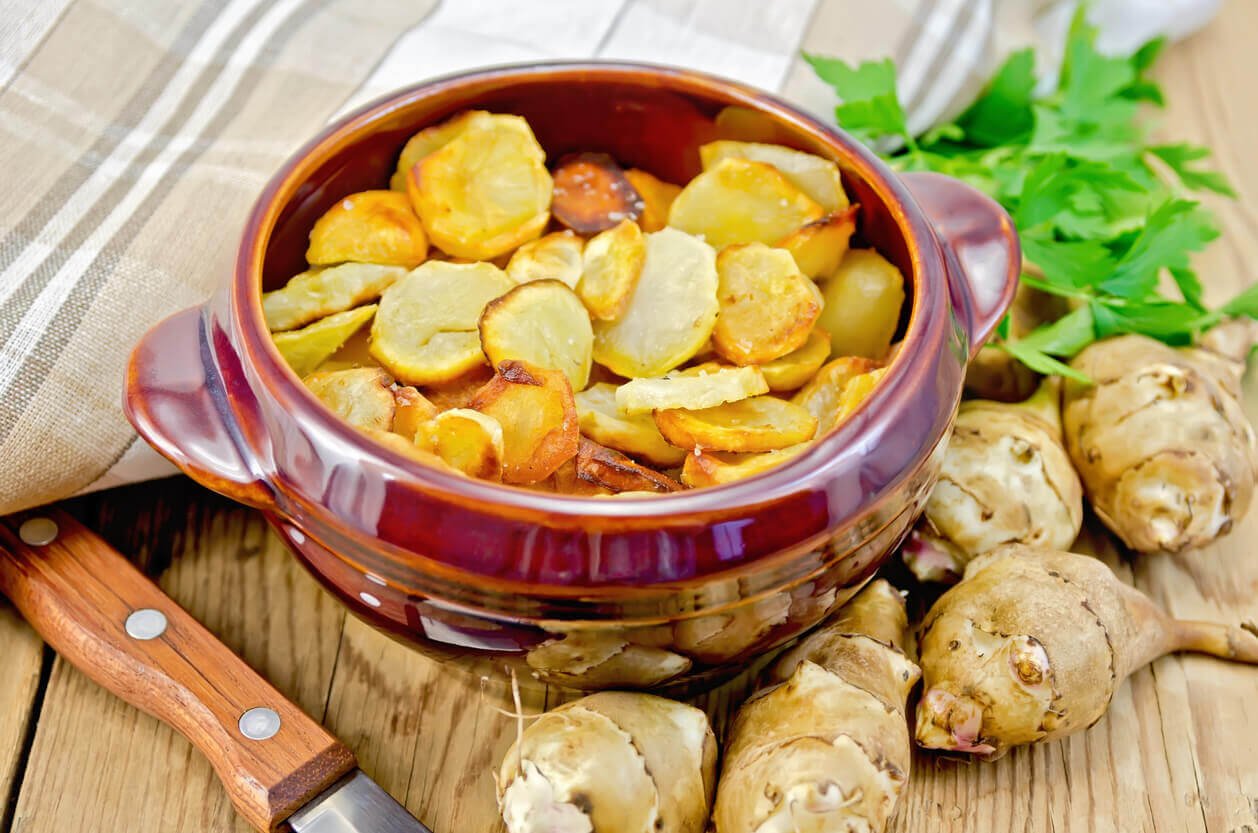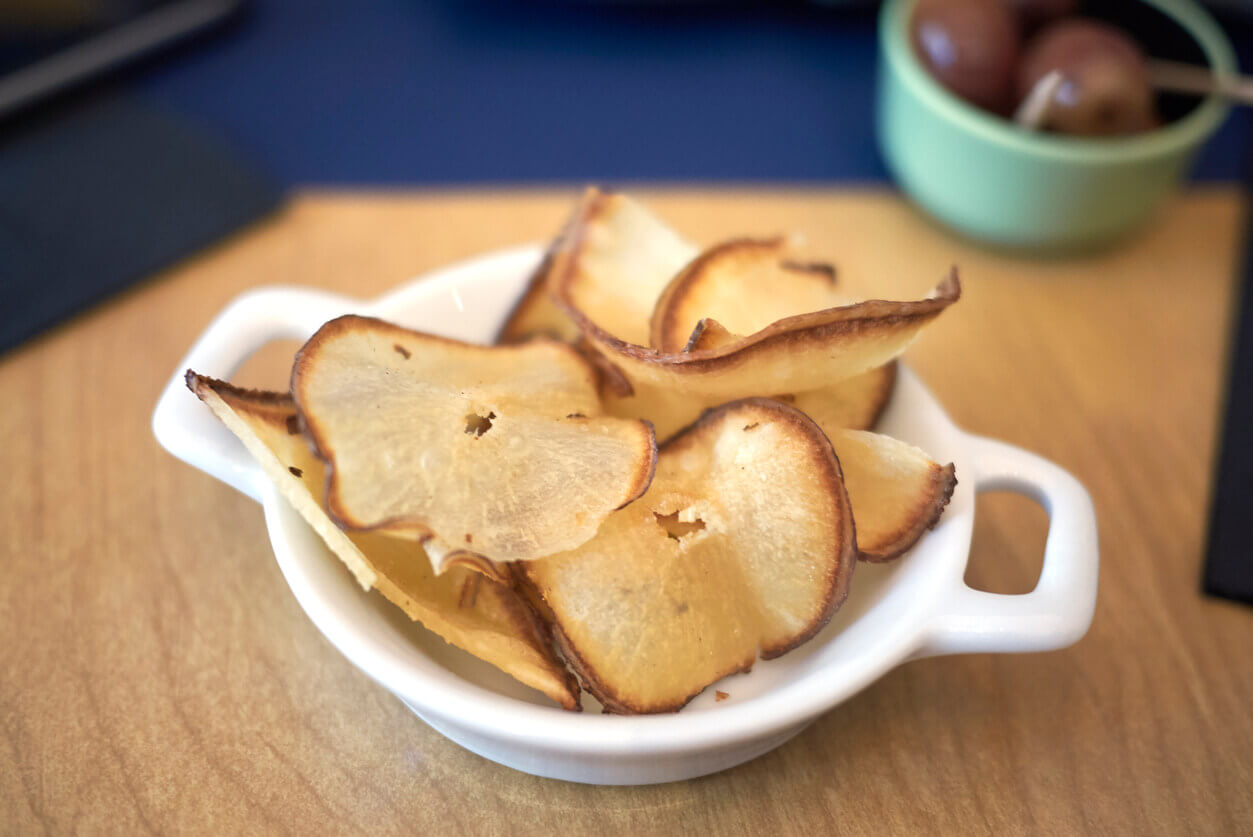If you’ve ever perused the less prominent areas of the produce section and wondered, what is that ginger root-ish, potato-y, almost pine cone looking thing, you’ve probably found a Jerusalem artichoke. What does it taste like, and how do you prepare it? Does it have any health benefits? We’re answering these questions and more in this article.
What Are Jerusalem Artichokes?

The Jerusalem artichoke, or sunchoke, is a tuber vegetable that comes from a type of sunflower native to the Americas. The plant can grow between 5-10 feet in height, standing slightly taller than a typical sunflower plant and carries many flower heads that are golden in color.
The Jerusalem artichoke isn’t actually an artichoke, and it’s not from Jerusalem. Aside from that, the name makes perfect sense. Before we get into its nutritional and culinary properties, let’s explore the origins of this mysterious tuber and its name.
What’s in a Name?
The “artichoke” part of the name comes from how the tubers taste when baked: like what you’d get if a potato and an artichoke heart had a mild-tasting baby. The Jerusalem artichoke produces knobbly, white-fleshed (or less commonly, red-fleshed) tubers that can be eaten either raw or cooked. Uncooked, the flesh has a nutty, sweet, crunchy flavor like raw chestnuts or mild radishes. When baked in their skin — which can be pink, purple, or gray — Jerusalem artichokes acquire that potato-artichoke taste.
As for the “Jerusalem” part of the name, we’re less certain. One theory says that because the tuber was a staple food for pilgrims in North America, which they thought of as “new Jerusalem.” Another possible origin is that “Jerusalem” sounds like “girasole,” the Italian word for sunflower. Finally, there’s a theory which points to a 17th-century Dutch gardener named Petrus Hondins, who distributed the tubers throughout Europe. Hondins was from Ter-Heusen, Holland, and “Ter-Heusen” became “Jerusalem” in the United States. (This one seems like a real stretch to me.)
Other names for the plant include French or Canada potato (these make at least a bit of sense), earth apple, and sunroot. It turns out that its most popular alternate name, sunchoke, was actually coined in the 1960s by a produce wholesaler trying to create a little zing and buzz for the homely little tuber.
Nutritional Value
We can argue about the origin of the name, but we don’t have to wonder about nutritional value. Jerusalem artichokes are high in complex carbohydrates, similar to potatoes, but they taste more sweet than starchy. They’re also high in antioxidants as well as a variety of vitamins and minerals.
Jerusalem artichokes are also a good source of inulin and oligofructose, which are types of fiber that act as potent prebiotics, or food for probiotics, which are the good bacteria in your gut. Inulin is a soluble fiber that also works to balance your blood sugar.
5 Health Benefits of the Jerusalem Artichoke

The Jerusalem artichoke offers a number of potential health benefits that are supported by research.
1. It may help you to fight off diseases.
Jerusalem artichokes contain a sizable amount of vitamins C, A, and E, which are powerful antioxidants. Antioxidants are important compounds found in fruits and vegetables. They fight off free radicals that can ultimately lead to the development of disease. A 2013 study published in Food Chemistry looked at the antioxidant capability of the Jerusalem artichoke, finding it to have strong, “free radical scavenging activity.” In other words, it contains antioxidants that can protect your cells from damage. Other research has shown that bioactive compounds in Jerusalem artichokes can be isolated. They were found to be used for antifungal, antioxidant, and anticancer purposes.
2. It may be helpful for managing blood sugar.
The Jerusalem artichoke has a low glycemic load, which means that it doesn’t tend to spike your blood sugar when you eat it. Furthermore, a 2018 study published in Nutrition & Diabetes, looked at how 20 grams of Jerusalem artichokes mixed with 20 grams of fermented soybean power affected the blood glucose levels in 60 people with prediabetes and type 2 diabetes. Researchers found that, over 12 weeks of daily supplementation, participants who consumed this mixture reduced their blood sugar level after eating, compared to a placebo group. The Jerusalem artichoke and soybean group also experienced lower oxidative stress. This signified a healthier balance between disease-causing free radicals and the antioxidants that neutralize them.
3. It may improve your digestive health.
Jerusalem artichokes are a good source of fiber, especially inulin, and prebiotics, making them beneficial for your digestive health. They may even have protective benefits against colon cancer. A 2013 study published in the Journal of Veterinary Science examined just how protective inulin is against this disease. The researchers randomly (and rather cruelly, in my opinion) assigned 30 very unfortunate young rats to either:
- A control group
- A group given dimethylhydrazine — a chemical used to induce colon cancer in lab experiments
- And a group given dimethylhydrazine plus inulin
After the 28-week experiment was over, the rats who were given inulin were protected from inflammation and cellular changes that precede colon cancer development, compared to the dimethylhydrazine group.
4. It may help keep your bones strong.
Jerusalem artichokes are a good source of phosphorus, an important mineral for your bones. In fact, their leaves have been used in folk medicine for the treatment of bone fractures. Some research shows that consuming inulin-containing foods, like Jerusalem artichokes, daily could increase:
- Calcium absorption
- Bone mineralization during adolescence
This suggests that inulin is an important nutrient for bone health.
5. It may help prevent iron-deficiency anemia.
Jerusalem artichokes contain among the highest amounts of iron when compared to other popular root and tuber vegetables. In fact, just one cup (150 grams) of chopped Jerusalem artichokes offers nearly 30% of your daily iron needs.
2 Potential Downsides to Eating Jerusalem Artichokes

Although Jerusalem artichokes offer several health benefits, there are some people who may want to avoid eating them.
1. People with a sensitive stomach.
The same factors that give Jerusalem artichokes so many digestive benefits are also the reason they may be contra-indicated for people with particularly sensitive digestive tracts. The inulin and oligofructose could cause gas, bloating, and even abdominal pain and diarrhea in certain people. The 17th-century British farmer, John Goodyear, wrote that Jerusalem artichokes were more fit for swine than for men due to their tendency to cause a lot of flatulence. As a result, they’ve earned the nickname “fartichokes” in some places.
His exact words, which I will quote directly because they’re so much fun to read, were, “…they stir up and cause a filthie loathsome stinking winde with the bodie…”
If you know that you have a sensitive digestive tract, you might want to practice a bit of initial caution with Jerusalem artichokes. You want to make sure you will tolerate them well. Be sure to cook them well because eating them raw — especially with the peel left on — is more likely to cause digestive upset. If you’re growing your own Jerusalem artichokes, some people say that it can help to harvest them after the first frost.
2. People with hereditary fructose intolerance (HFI).
HFI is a rare metabolic disease caused by mutations in the ALDOB gene, in which a person lacks an enzyme called aldolase B. People who have HFI risk severe low blood sugar and the accumulation of harmful substances in their liver if they consume fructose (sugar from fruits and vegetables) or sucrose (table, cane, or beet sugar). Jerusalem artichokes are a concentrated source of fructose, so people with HFI should avoid this tuber.
How To Choose, Eat, and Store Jerusalem Artichokes

You can find Jerusalem artichokes at many local grocery stores and farmers markets. However, they may not be there in abundance, as they’re not nearly as popular as apples or bananas. When making your selection, choose a Jerusalem artichoke that doesn’t have soft or dark spots, feels firm, and is free of cuts or gouges. Jerusalem artichokes are knobby tubers, so this is to be expected, but if you find one with fewer knobs it may be easier to slice.
Jerusalem artichokes are best stored loosely wrapped in a paper towel, and placed in a resealable enclosed bag in the crisper drawer of your fridge. Here, they will typically last for up to two weeks, depending on how fresh they were when you first stored them.
Eating Jerusalem Artichokes
You can enjoy Jerusalem artichokes either raw or cooked. Before eating, be sure to clean them well under water, using a kitchen brush to remove dirt from crevices and knobs.
If you want to try your Jerusalem artichokes raw, you can peel off the skin to reduce potential digestive discomfort (but the skin is edible if you choose to leave it on). A great way to eat raw Jerusalem artichokes is to grate or chop them onto salads.
Alternatively, you can chop or dice Jerusalem artichokes before cooking them. Like potatoes or other root vegetables, they roast really well. Cooked Jerusalem artichokes can be a perfect addition to soups and stews, or as a side dish. They can also be mashed and seasoned with a mix like garlic and nutmeg. Or, you can make Jerusalem artichoke chips by thinly slicing them, tossing with a bit of olive oil and (if you eat it) salt, and baking them in the oven until crispy.
Some people have even made their own Jerusalem artichoke flour, which can apparently substitute for wheat flour in certain recipes. It sounds like a bit of an ordeal, but you may find it to be a delicious and healthy, gluten-free flour option. You can also order it online.
Growing Jerusalem Artichokes
And if you want to grow your own Jerusalem artichokes, just be sure to maintain the plot or bed against spreading. When Jerusalem artichokes are left to their own devices, they tend to go awry, often choking out surrounding plant species. Some farmers even think of them as weeds because they can become so invasive. However, the silver lining is that Jerusalem artichokes are fairly perennial because the roots persist and sprout new vegetative growth every year, so you don’t have to keep replanting them.
Jerusalem Artichoke Recipes
Here are some tasty recipes that use Jerusalem artichokes in creative ways.
Jerusalem Artichoke Lentil Burgers by Full of Plants

This is a creative twist on a lentil burger that uses an array of veggies including five Jerusalem artichokes. And it’s flavored with coconut milk, nutritional yeast, dried cranberries, and seasonings.
Fresh Herb Roasted Sunchokes by Cooking on the Weekends
Next time you’re rooting around (get it?) for a delicious tuber to roast, consider replacing your go-to potatoes with Jerusalem artichokes. This recipe uses sliced Jerusalem artichokes tossed with olive oil and fresh herbs to make an aromatic side dish.
Roasted Sunchoke and Barley Bowl with Zaatar Tahini Sauce by Feasting at Home
Who doesn’t love a good bowl? This recipe combines Jerusalem artichokes with whole grains, mushrooms, kale, and a tahini-based sauce to make a delicious and nutrient-packed meal.
Jerusalem Artichoke Soup by From the Grapevine
This recipe could be a creamy alternative to your favorite potato soup, using Jerusalem artichokes, garlic, almonds, and saffron to create an intriguing flavor blend.
Should You Eat Jerusalem Artichokes?

If you’re looking for a new food to try, Jerusalem artichokes can be a nutritious addition to your diet. It can seem like a bit of a challenge to figure out what to do with something new, but Jerusalem artichokes can be used just as easily as a potato or other root vegetable. Just be sure to take it slow (or at least warn others!) if you have a sensitive stomach. Or plan on spending some quality time alone after your first experience! Just in case.
Tell us in the comments:
- Do you like Jerusalem artichokes?
- What is your favorite way to enjoy them
Featured Image: iStock.com/bhofack2

